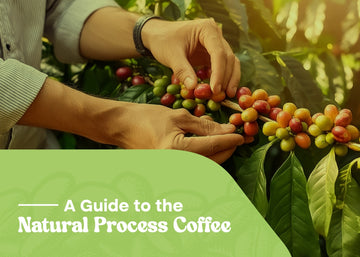What Makes Natural Process Coffee Unique?
Most of the coffee enthusiasts often seek to know what is natural coffee and how to make natural coffee? In other words, processing coffee refers to the actual procedure through which coffee cherries are transformed into green beans ready for roast. This procedure has a very significant influence on the sensation of taste, aroma, and general quality of the coffee. Before we can enjoy the ground, roasted, and brewed coffee, many steps need to be taken. Fruit typically grows on a tree, and this tree is covered with coffee beans. The fruit is sometimes referred to as "cherries," and inside these cherries are seeds known as coffee beans. The cherries that will eventually become coffee must be processed upon being pulled off the plant. This means removing some of the outer layer of the seed and getting out the pulp. The three basic processing techniques are natural (dry), honey-treated, and washed (wet).
- Washed (Wet) Processing: In this processing, the coffee cherries are first depulped to remove the fruit layer outside. Then through a fermentation process in water, the sticky mucilage is washed away. Bright, alive tastes arise from the beans when they get washed, dried, and processed.
- Natural (Dry) Processing: The processing technique uses full sun drying, and it uses the whole coffee cherry. This will absorb fruity tastes to create the beans' profiles sweet as well as more fruity. Good management is important in order to avoid faults.
- Honey Processing: This processing type carries some mucilage onto the beans before drying. The depth of mucilage left will determine the color from white to yellow to red to black. The coffee is well-balanced in acidity and sweetness.

Every processing method impacts the end flavor, hence making coffee processing an essential process in determining its flavor profile. However regional environmental factors and traditions may have an impact on the what is natural process coffee. Different processing methods are used in different regions of coffee production.
Which Way Is Better for Processing Coffee?
Actually, that depends on the preference of the coffee drinker and the origin of the coffee. Natural-processed coffee best suits individuals who want strong fruity tastes. The best choice for acidity and clarity is the washed coffee. A honey processing method is great for people who prefer intricacy since it strikes a good balance between the two.
The term "Natural" describes the process of removing the fruit from the seed that doesn't make use of water or technology. Fruit is left attached to the seed as coffee dries "naturally" in sunlight and air. The use of the term "washed", however, is applied to the method of removing the fruit through the use of water, before drying; this neither reduces the naturalness of the coffee nor its cleanliness.
Natural (dry) is the best processing method for full-bodied, sweet, and fruity coffees. Its taste profile that tastes a little bit of tropical fruit, wine, and berries makes it suitable for places that have limited access to water. One challenge faced with this method is that to avoid flaws and fermentation, careful drying is required. While this process develops the sweetness in coffee, it may be unstable if not checked keenly.
On the other hand, a clean, bright, and crisp high-acidity coffees will be best processed using the washed wet technique. There are elements of citrus, flowers, and tea in the taste profile. On the other hand, it needs a lot of water and certain tools. These are the factors that influence how to make natural coffee?
Coffee processed using the honey technique has flavors characteristic of stone fruits, caramel, and a hint of acidity, well-balanced between sweetness and acidity. A good compromise between natural and clean ways, but a lot of work is needed and proper drying management.
What is the taste of coffee produced by the natural method?
- After getting what is natural process coffee, now we will discuss about taste. The natural flavor of the method is pungent and earthy with a fruity resonance and sweet notes. It is one of the oldest methods of coffee processing which involves drying the whole coffee cherry fruit unprocessed. It thrives in dry lands like deserts, particularly parts of Ethiopia and Brazil.
The Taste Profile and How It Works?
- Harvested, ripened cherries are laid on the sun with patios or raised beds. Workers usually turn around the cherries on a regular basis; this ensures even drying, thus preventing mold or fermentation from developing. This process takes around two to four weeks, depending on the weather. The green coffee beans are exposed when the outer layers, namely skin, pulp, and parchment, are mechanically removed after they have dried. Much-hyped for its highly fruity and wine-like aromas, this coffee often manifests chocolate, cherries, or tropical fruits in notes. The bigger body, prominent sweetness, and mild acidity usually accompany it.
Who will enjoy Natural Coffee?
- Specialty coffee consumers seeking a difference most often prefer it, as coffee producers who use natural tend to favor strong, sweet, and fruity tastes. Some of the world's best organically processed coffees are made in Yemen, Ethiopia, and Brazil, appreciated for their deep fruit flavors and wine-like aftertastes.
Does anyone like coffee that is naturally produced?
- The distinctive, forceful flavors of processing coffee are polarizing; thus, not everyone will like it. Many coffee lovers enjoy the taste for its uniqueness and complexity; inquiring coffee aficionados often find the fruity, wine-like overtones very appealing. To others, though, the strong fruit flavors-the strawberries and tropical fruits- are overpowering, so they prefer the softer, cleaner coffees. Some customers may find that coffees that are naturally sundried are too fermented or boozy when the processing hasn't been done well. Any errors in the drying process can lead to defects and varied tastes.
How Do I Know Which Coffees Are Sundried Naturally?
- Most roasters will note the processing method on their label. This will able to help you find natural coffee. Natural, dry-processed coffees can be told from washed coffees due to differing flavors, aromas, bodies, and packaging. The flavor is one of the ways through which the processing method can be differentiated; natural coffee often comes with the flavor of blueberries, strawberries, or purple grapes!
These points enable you to understand what natural (sun-dried) coffee is:
- It will show notes of wine or fermentation with lower acidity. Conversely, washed coffees tend to be even lighter in body, and taste sharper due to fresh acidity and clean, crisp flavors with citrus, florals, or tea impressions.
- Check the bag or label of your coffee. Specialty roasters will typically tell you how the beans were processed on the bag. For example, look for words such as "natural," "sun dried," and "dry process."
- When you are brewing natural coffee, often you get more aroma and beautifully tasty flavor. On the other hand, washed coffees are often presented in lighter roasts and pour-overs and tend to give you a brighter, cleaner cup.
The natural process coffee is usually experienced in Yemen, Ethiopia, and Brazil-
- The natural process coffee is often seen in Yemen, Ethiopia, and Brazil. This method is still applied to most farms in these countries because they respect history and the natural approach, especially in some of the driest regions in the world where water and machinery resources are almost scarce. Natural processing is often still used in nations such as Ethiopia, Yemen, Brazil, and Costa Rica, the latter of which is famous for honey technique.
Factors Which Have Enabled Natural Processing to Gain Popularity
- Little humidity and a lot of sunshine are the conditions necessary to allow natural processing. Examples of regions where, under right conditions, natural coffee can be produced efficiently include Ethiopia and Brazil.
- For centuries, natural processing has been a significant part of the story of coffee in the region. The flavors-it has a full, fruit-forward flavor profile-are also very much in keeping with the taste of the local market.
- Processing tends to be less water-intensive than conventional processing, which consumes large amounts of both water and infrastructure. This makes it even more feasible as a substitute in areas where resources are scarce.
- More and more roasters and consumers want to have unique taste qualities because specialty coffee is becoming one of the trendiest types of coffee nowadays. Specialty coffee buyers usually target countries that can produce superb quality natural coffee.
In a nutshell
The natural processing of coffee produces a unique and complex flavor with the taste of its mother earth and origin location. This process, through the tender drying without affecting the fruit, will show its delicious sweetness and fruity flavor. Quality control and fermentation, although possibly a concern for most, really define the complicated relationship of nature and coffee farming. All in all, a finer knowledge and appreciation of this process will add to one's greater enjoyment of the vast world of coffee.




